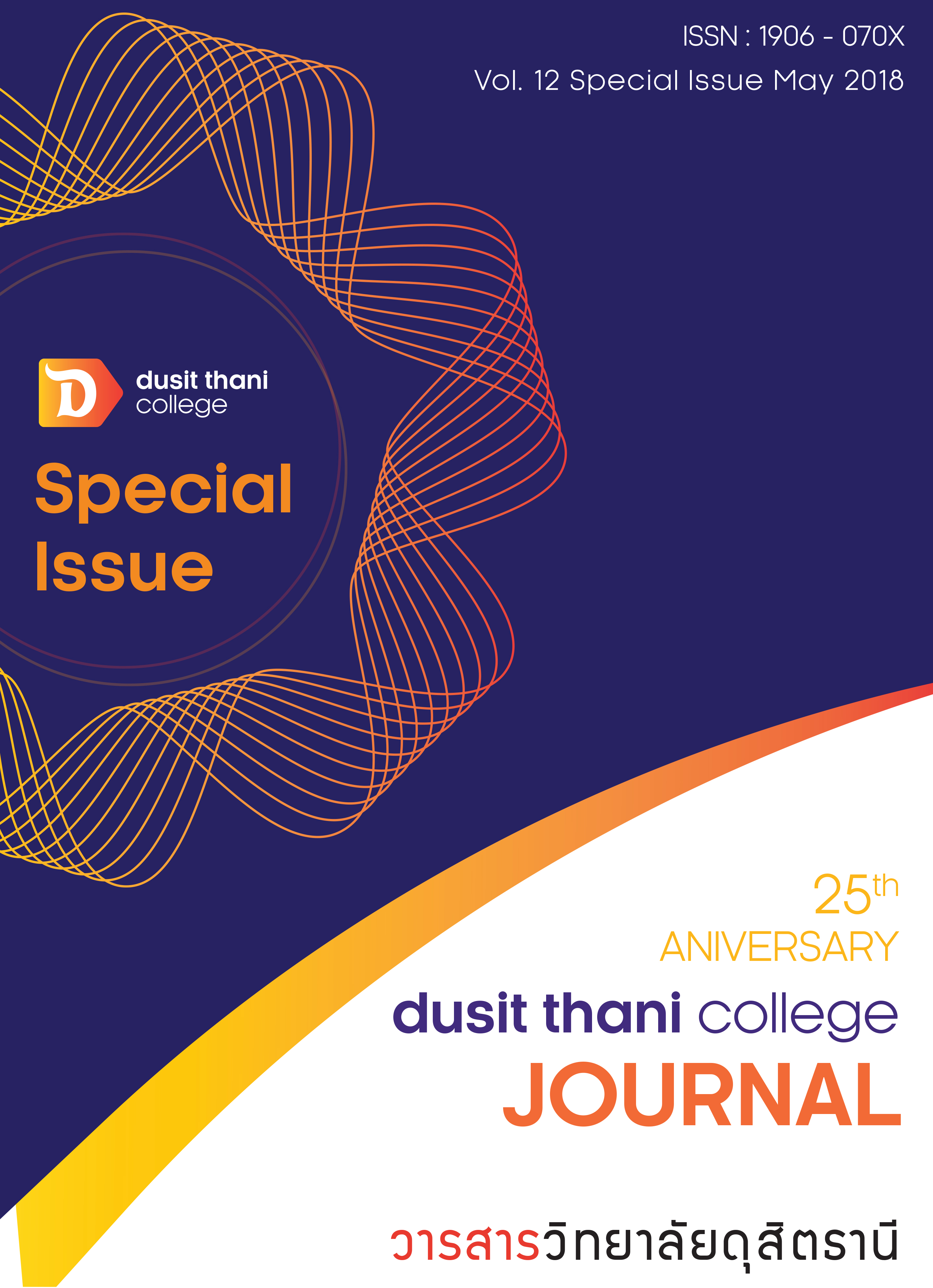โครงสร้างการจัดการเพื่อกระบวนการสร้างความร่วมมือในการพัฒนาให้เกิดมูลค่าเพิ่ม ในการท่องเที่ยวโดยชุมชนอย่างยั่งยืน
Main Article Content
บทคัดย่อ
การวิจัยครั้งนี้มีวัตถุประสงค์เพื่อค้นหารูปแบบและวิธีการที่เหมาะสมสำหรับการสร้างความร่วมมือของหลากหลายภาคส่วนในกระบวนการการมีส่วนร่วมในการพัฒนาให้เกิดมูลค่าเพิ่มด้านการท่องเที่ยวโดยชุมชนอย่างยั่งยืน โดยคัดเลือกพื้นที่ศึกษาเพื่อให้เห็นผลเชิงเปรียบเทียบจำนวน 3 พื้นที่ตามระดับการเข้ามาของทุนนิยมและระดับการพัฒนาการท่องเที่ยวที่แตกต่างกัน ได้แก่ พื้นที่ท่องเที่ยวขนาดเล็กที่มีการจัดการโดยชุมชน (บ้านไร่กองขิง) พื้นที่ท่องเที่ยวที่กำลังเติบโตและเป็นจุดหมายปลายทางในระดับประเทศ (อำเภอเมือง จังหวัดสมุทรสงคราม) และพื้นที่ท่องเที่ยวที่มีความเจริญในระดับสูงและเป็นที่รู้จักในระดับนานาชาติ (อำเภอเมือง จังหวัดเชียงใหม่) โดยงานวิจัยนี้ใช้กรอบความคิดแบบมีส่วนร่วมด้วยความชื่นชม (Appreciative Participatory Planning and Actions) มาเป็นแนวทางในการศึกษา
ผลการศึกษาพบว่า รูปแบบการสร้างความส่วนมือแตกต่างกันตามบริบทของพื้นที่ กล่าวคือ การสร้างการมีส่วนร่วมในพื้นที่ที่มีความเจริญระดับสูงทำได้ค่อนข้างยาก ในขณะที่การจัดโครงสร้างการทำงานแบบแยกส่วนอย่างเป็นเอกเทศของแต่ละกลุ่มมักช่วยให้การทำงานเป็นไปอย่างคล่องตัว อย่างไรก็ตาม การพัฒนาในรูปแบบนี้จะเกิดขึ้นได้ถ้ามีตัวเชื่อม (Convener) ที่ดีที่จะมาช่วยประสานการทำงานของแต่ละกลุ่ม ในขณะที่โครงสร้างการทำงานแบบสร้างคุณค่าร่วมกัน (Creating Shared Values) ของคนเฉพาะกลุ่มที่มีเป้าหมายในการทำงานเดียวกันนั้นจะเหมาะกับพื้นที่ที่กำลังอยู่ในกระแสการท่องเที่ยวเชิงพาณิชย์ ในทางตรงข้าม พื้นที่ชนบทที่ความเป็นเมืองยังเข้าไม่ถึง ควรเป็นการทำงานแบบเครือญาติที่มีผู้นำเป็นศูนย์กลางและมีบทบาทหลักในการสร้างความร่วมมือของคนในพื้นที่
Article Details
นโยบายการพิจารณากลั่นกรองบทความ
- บทความวิจัยและบทความวิชาการทุกเรื่องที่จะได้รับการตีพิมพ์ต้องผ่านการพิจารณากลั่นกรองโดยผู้ทรงคุณวุฒิ (Peer Review) ในสาขาที่เกี่ยวข้อง จำนวน 3 ท่าน/บทความ
- บทความ ข้อความ ภาพประกอบและตารางประกอบที่ลงตีพิมพ์ในวารสารเป็นความคิดเห็นส่วนตัวของผู้เขียน กองบรรณาธิการไม่จำเป็นต้องเห็นด้วยเสมอไป และไม่มีส่วนรับผิดชอบใด ๆ ถือเป็นความรับผิดชอบของผู้เขียนแต่เพียงผู้เดียว
- บทความที่จะได้รับการตีพิมพ์จะต้องไม่เคยตีพิมพ์ เผยแพร่ที่ใดมาก่อน และไม่อยู่ระหว่างการพิจารณาของวารสารฉบับอื่น หากตรวจสอบพบว่ามีการตีพิมพ์ซ้ำซ้อน ถือเป็นความรับผิดชอบของผู้เขียนแต่เพียงผู้เดียว
- บทความใดที่ผู้อ่านเห็นว่าได้มีการลอกเลียนหรือแอบอ้างโดยปราศจากการอ้างอิง หรือทำให้เข้าใจผิดว่าเป็นผลงานของผู้เขียน กรุณาแจ้งให้กองบรรณาธิการวารสารทราบจะเป็นพระคุณยิ่ง
เอกสารอ้างอิง
Chantavanich, Supang. (2011). Qualitative Data Analysis. Bangkok: Chula Press.
Cohen, J.M. and Uphoff, N.T. (1981). Rural Development Participation: Concept and measures for project design implementation and evaluation. Ithaca, NY: Rural Development Committee Center for International Studies, Cornell University.
College of Arts, Media and Technology, Chiang Mai University. (2014). Present Period of Chiang Mai. Retrieved December 1st, 2016 from https://wadwiangcm.camt.cmu.ac.th/content.php?idhis=5
Hammond, S. A. (2013). The thin book of appreciative inquiry. Plano, TX: Thin Book Publishing.
James, P., Nadarajah, Y., Haive, K., & Stead, V. (2012). Sustainable Communities, Sustainable Development: Other paths for Papua New Guinea. Honolulu: University of Hawaii Press.
Jitsuchon, Somchai. (2007). Assessment of Macroeconomic Policies after the 2006 Political Reform. Bangkok: Thailand Development Research Institute Foundation.
Phramaha Suthit Apakaro. (2004). Network: Nature, Knowledge and Management. Bangkok: Learning Promotion for Happiness Community.
Suansri, Potjana. (2003). Teaching Publications 8-15: Recreation and nature tourism management. Nonthaburi: Sukhothai Thammathirat University
Suwannarat, Samart. (2015). Participatory Approaches to Managing Cultural Heritage the old city of Chiang Mai. Chiang Mai: Social Research Institute.
Strauss, A. L. and Corbin, J. M. (1998). Basics of qualitative research: Techniques and procedures for developing grounded theory. Thousand Oaks: Sage Publications.
Tourism Authority of Thailand. (n.d). Chiang Mai. Retrieved November 23rd, 2016 from https://na.tourismthailand.org/About-Thailand/Destination/Chiang-Mai
Tourism Authority of Thailand. (n.d). Samut Songkhram. Retrieved November 23rd, 2016 from https://na.tourismthailand.org/About-Thailand/Destination/Samut-Songkhram
Wisansing, Jutamas and Hongchatikul, Udom. (2012). Appreciative inquiry (AI) framework and participatory techniques for sustainable tourism development: Case examples from Thailand. Paper presented at the 2012 Conference on Sustainable Business in Asia.
Yanasan, Sanay. (2004). Urban Geography. Chiang Mai: Department of Geography, Faculty of Social Sciences, Chiang Mai University.


